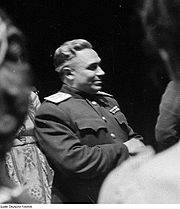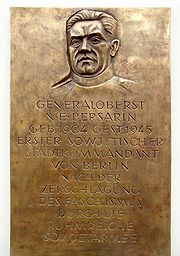
Nikolai Berzarin
Encyclopedia

Russian language
Russian is a Slavic language used primarily in Russia, Belarus, Uzbekistan, Kazakhstan, Tajikistan and Kyrgyzstan. It is an unofficial but widely spoken language in Ukraine, Moldova, Latvia, Turkmenistan and Estonia and, to a lesser extent, the other countries that were once constituent republics...
Николай Эрастович Берзарин) (April 1, 1904 in St. Petersburg – June 16, 1945 in Berlin
Berlin
Berlin is the capital city of Germany and is one of the 16 states of Germany. With a population of 3.45 million people, Berlin is Germany's largest city. It is the second most populous city proper and the seventh most populous urban area in the European Union...
) was a Soviet Red Army General during the Stalinist
Stalinism
Stalinism refers to the ideology that Joseph Stalin conceived and implemented in the Soviet Union, and is generally considered a branch of Marxist–Leninist ideology but considered by some historians to be a significant deviation from this philosophy...
era and the Second World War. In 1945 he became commander of the Soviet occupying forces in Berlin.
Family
Berzarin was born the son of a pipefitter and a seamstress. He had one brother and four sisters.In 1925, he married bank employee Natalja Prosinjuk, with whom he had two daughters, Larissa and Irina.
Training
In 1918 Berzarin enlisted in the Red ArmyRed Army
The Workers' and Peasants' Red Army started out as the Soviet Union's revolutionary communist combat groups during the Russian Civil War of 1918-1922. It grew into the national army of the Soviet Union. By the 1930s the Red Army was among the largest armies in history.The "Red Army" name refers to...
and fought against invading troops in Archangelsk. Between 1921 and 1923 he received more military training at the Leningrad Command Courses, machine gun course at he "Vistrel" and a command course at the Siberian Military District
Siberian Military District
The Siberian Military District was a Military district of the Russian Ground Forces. In 2010 it was divided between the two newly formed Central and Eastern Military Districts.- History :...
. In 1922, he became a member of Komsomol
Komsomol
The Communist Union of Youth , usually known as Komsomol , was the youth division of the Communist Party of the Soviet Union. The Komsomol in its earliest form was established in urban centers in 1918. During the early years, it was a Russian organization, known as the Russian Communist Union of...
. In 1923 he was assigned to Siberia
Siberia
Siberia is an extensive region constituting almost all of Northern Asia. Comprising the central and eastern portion of the Russian Federation, it was part of the Soviet Union from its beginning, as its predecessor states, the Tsardom of Russia and the Russian Empire, conquered it during the 16th...
.
In 1926, after officer training, he became a member of the CPSU.
Military career
Begun service as an enlisted soldier in the Soviet Union17th Army (Soviet Union)
The 17th Army of the Red Army was a Soviet field army. It was formed from the 1st Army Group of the Transbaikal Military District on 21 July 1940 . From 1941 to 1945, the army assumed a general defensive posture, including within Mongolia...
in the then Petrograd, and after service on the Northern Front against the Intervention also participated in the suppression of the Kronstadt Rebellion
Kronstadt rebellion
The Kronstadt rebellion was one of many major unsuccessful left-wing uprisings against the Bolsheviks in the aftermath of the Russian Civil War...
(1921). In 1924 he was serving as a junior officer in the Amur region against the bandit raiders.
In 1927 he returned to Siberia, where he was an assistant to commander of an officers training unit in Irkutsk
Irkutsk
Irkutsk is a city and the administrative center of Irkutsk Oblast, Russia, one of the largest cities in Siberia. Population: .-History:In 1652, Ivan Pokhabov built a zimovye near the site of Irkutsk for gold trading and for the collection of fur taxes from the Buryats. In 1661, Yakov Pokhabov...
. From 1933 to 1935, he served in the staff of the Separate Far Eastern Army; from 1935 to 1937 he led the 77th Infantry Regiment of the 26th Infantry Division of the Far East Army. Until 1938, he was the chief instructor of the Amur group.
During the Great Purge
Great Purge
The Great Purge was a series of campaigns of political repression and persecution in the Soviet Union orchestrated by Joseph Stalin from 1936 to 1938...
, he was accused of owing his career to the "enemies of the people", but was supported by various Communist Party members. As division commander, he repelled Japanese attacks at Lake Khasan (1938), for which he was awarded the Order of the Red Banner
Order of the Red Banner
The Soviet government of Russia established the Order of the Red Banner , a military decoration, on September 16, 1918 during the Russian Civil War...
.
After his appointment as Major General
Major General
Major general or major-general is a military rank used in many countries. It is derived from the older rank of sergeant major general. A major general is a high-ranking officer, normally subordinate to the rank of lieutenant general and senior to the ranks of brigadier and brigadier general...
, he was transferred at his own request to Riga
Riga
Riga is the capital and largest city of Latvia. With 702,891 inhabitants Riga is the largest city of the Baltic states, one of the largest cities in Northern Europe and home to more than one third of Latvia's population. The city is an important seaport and a major industrial, commercial,...
, and became commander of the 27th Army in May 1941.
He fought against the German armed forces after their assault on the Soviet Union. From December 1941 to May 1944 he was Commander-in-Chief of several armies; he was badly wounded in March 1943 and was hospitalized for six months.
He received the Order of Lenin
Order of Lenin
The Order of Lenin , named after the leader of the Russian October Revolution, was the highest decoration bestowed by the Soviet Union...
and was promoted to Colonel General
Colonel General
Colonel General is a senior rank of General. North Korea and Russia are two countries which have used the rank extensively throughout their histories...
for his success in breaking through German lines in the Jassy-Kishinev Offensive. After conquering Kishinev in August 1944, the Belorussian and Ukrainian Fronts
Front (Soviet Army)
A front was a major military organization in the Soviet Army during many wars. It was roughly equivalent to an army group in the militaries of most other countries except Germany...
began their march on Berlin.
Commander of Berlin
During the Battle of BerlinBattle of Berlin
The Battle of Berlin, designated the Berlin Strategic Offensive Operation by the Soviet Union, was the final major offensive of the European Theatre of World War II....
, Berzarin's 5th Shock Army reached the outskirts of Berlin on April 21, 1945 as the first Soviet Army to do so. On April 24, he was appointed commander of the city by Marshall Zhukov
Georgy Zhukov
Marshal of the Soviet Union Georgy Konstantinovich Zhukov , was a Russian career officer in the Red Army who, in the course of World War II, played a pivotal role in leading the Red Army through much of Eastern Europe to liberate the Soviet Union and other nations from the Axis Powers' occupation...
. He worked to re-establish order, creating a city police force and supplying the population with food. He appointed the first postwar municipal authorities and strove for a revival of the cultural life of the city.
On June 16 1945, after only 55 days in office, he died in a motorcycle accident in a truck convoy in Berlin, aged 41.
Honorary freeman of Berlin

East Berlin
East Berlin was the name given to the eastern part of Berlin between 1949 and 1990. It consisted of the Soviet sector of Berlin that was established in 1945. The American, British and French sectors became West Berlin, a part strongly associated with West Germany but a free city...
. He was formally removed from the roll of honorary citizens by the city of Berlin government in 1992.
In 2003, he regained the honorary citizenship. Detractors of the re-awarding affirmed that Berzarin would have been responsible of the deportation of 47,000 Balts. This accusations were proven wrong later on, since Berazin was deployed in Vladivostok at the questioned time.
In 2005, the PDS politician Thomas Flierl had a bridge named in honour of Berzarin.

